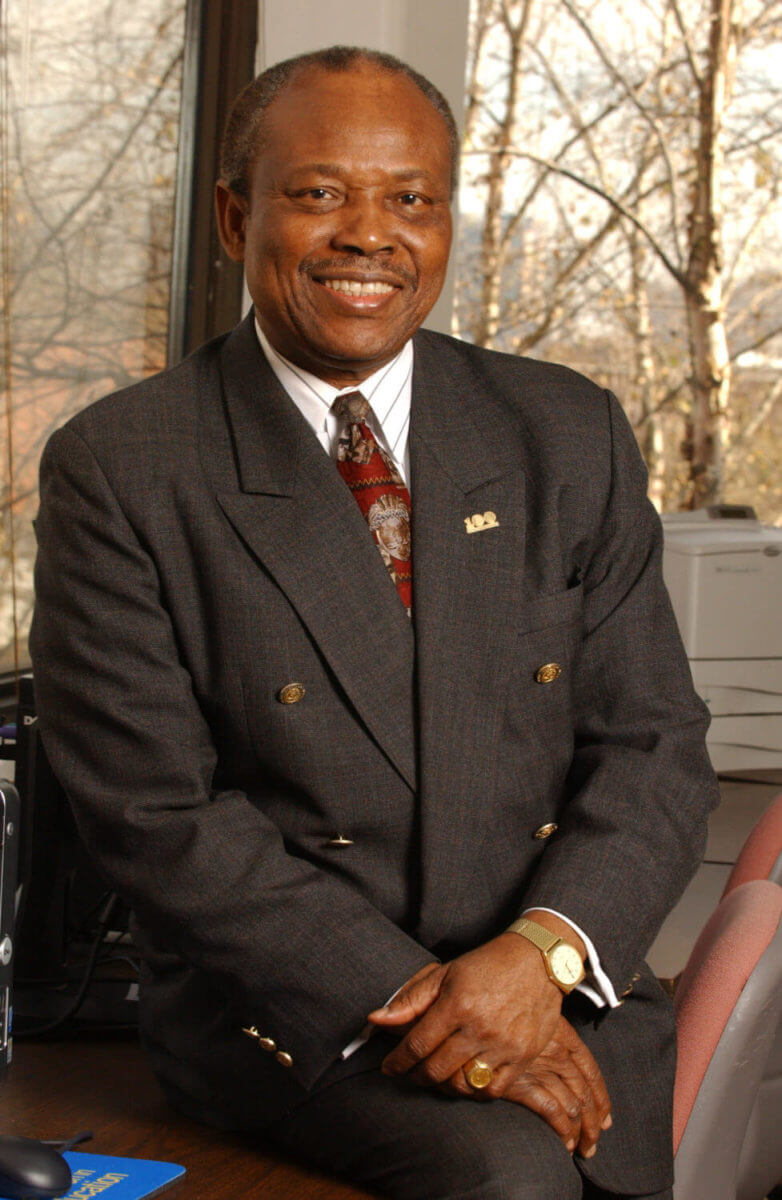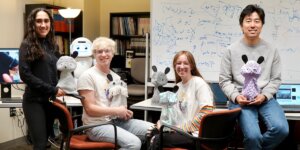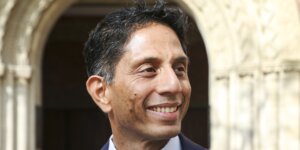
Augustine Esogbue, a professor emeritus at Georgia Tech, graduated with a Ph.D. from USC in 1968. Photo/Georgia Institute of Technology
Augustine Esogbue may have started his engineering career as an intellectual pursuit, but he has since become a force for social change. In 1968, Esogbue became the world’s first black Ph.D. in industrial and systems engineering. Now, he’s a professor emeritus in the Georgia Institute of Technology’s H. Milton Stewart School of Industrial and Systems Engineering. Esogbue has used the influence he gained from a dynamic career to improve opportunities for minorities in the field.
“Emeritus professor Augustine Esogbue has had an extraordinary impact over the course of his 38-year tenure with the school,” said Edwin Romeijn, chair of industrial and systems engineering. “As the first African-American professor at Georgia Tech, he was a champion of diversity initiatives on campus.”
In his lifetime, Esogbue has studied issues ranging from power distribution in developing countries to retrieval of space satellites for NASA. He also worked on power for prosthetic devices, patient safety systems in hospitals and other large-scale disaster control systems.
Born and raised in Nigeria, Esogbue came to the U.S. with a grant from the African Scholarship Program of American Universities (ASPAU). He studied electrical engineering at UCLA, and then completed his master’s degree in industrial engineering and operations research at Columbia University in less than one year.
Esogbue was already a bright prospect when he came to USC in 1965. Together with his mentor Richard Bellman, known as “the father of dynamic programming,” Esogbue set out to research mathematical modeling of bioscience, with the goal of improving large-scale systems within the healthcare field.
“Meeting Richard Bellman was a transformational moment for me,” Esogbue said. “When I came to USC, it was the beginning of a major era of change. It was very rare for one man to be criss-crossing traditional disciplines like mathematics, engineering and medicine.”
Bellman’s ability to traverse boundaries inspired Esogbue to do the same throughout his career. The professor also introduced Esogbue to UC Berkeley Professor Lofti A. Zadeh, who developed fuzzy logic during the 1960s.
Fuzzy logic, which uses “degrees of truth” in computations rather than the traditional “true or false” Boolean logic, became an integral part of Esogbue’s research career. It helped him solve power system stabilization issues for the Electrical Power Research Institute (EPRI) and enabled him to develop a sophisticated controller for retrieving NASA satellites.
Esogbue also used fuzzy logic to find solutions to sociotechnical and behavioral problems. For example, he analyzed human errors in the healthcare system that caused patients to get sicker during hospital stays. After noting inefficiencies in surgical scheduling procedures, Esogbue used statistical methods to design new policies that were safer and less costly.
Later, he became the first African to join NASA’s Safety Advisory Board following the explosion of the Columbia Space Shuttle. In this role, Esogbue used his expertise in systems engineering to reduce safety risks in future missions.
“A major power of fuzzy logic is that it is able to deal with human systems. It can capture and effectively represent social and humanistic variables,” Esogbue said.
Studying at USC was momentous for Esogbue in another way. In August 1965, mere weeks after he joined Bellman’s lab, the Watts riots decimated South L.A. Witnessing racial and socioeconomic conflict firsthand left its mark on the young engineer.
“For me, that was really the first explosion,” Esogbue said.
The Watts riots were followed by more riots nationwide and anti-Vietnam War demonstrations. Esogbue joined the faculty at Case Western University in Cleveland and then moved to Georgia Tech in Atlanta. In both cities, he watched racial tensions rise as the civil rights movement unfolded.
A friendship with Maynard Jackson, Atlanta’s first African-American mayor, gave Esogbue a front-row seat to regional politics, where he noticed a paucity of blacks in the work force. When he turned his gaze toward Georgia Tech’s engineering school, he discovered a similar dearth of black graduate students and faculty.
A systems engineer through and through, Esogbue viewed the problem as a sociotechnical issue that could be solved by reworking the city’s educational framework.
“You have the inputs—but you need to put a process in place to get the outputs you want. So I started looking critically at the process,” he said. “I found that the process was not set up to promote minority success.”
Since then, Esogbue has made it his mission to guide talented minority students through Georgia Tech’s engineering school and toward careers in the field. In 2016, the school graduated more minority and African-American Ph.D. students than any other U.S. engineering school, according to “Issues in Higher Education.” Esogbue also serves on the advisory board of the National Society of Black Engineers, and sponsors an annual scholarship at Georgia Tech.
Esogbue has been honored with the Nigerian National Merit Award, bestowed by the country’s president, as well as a Distinguished Service and Leadership Award from the Operations Research Society of America and a Distinguished Alumni award from UCLA. To this day, he continues to work with the Nigerian Academies of Science and Engineering to enhance opportunities for young researchers.
“It all began as just an intellectual pursuit,” he said. “But it has spiraled into many areas. When I began using a systems approach to life, that’s where I really see the fruits of my labor.”
Published on May 23rd, 2017
Last updated on September 19th, 2021













